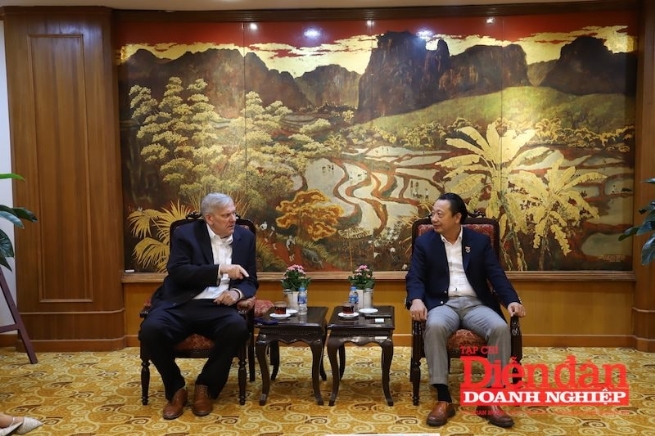Vietnam, U.S. Bolster Economic Cooperation and Business Connectivity
Mr. Nguyen Quang Vinh, Vice President of the Vietnam Chamber of Commerce and Industry (VCCI), recently held a working session with Mr. Lindsay Mark Lewis, Chief Executive Director of the Progressive Policy Institute (PPI) of the United States, in Hanoi.

VCCI Vice President Nguyen Quang Vinh had a meeting and worked with Mr. Lindsay Mark Lewis, Executive Director of the American Progressive Policy Institute (Photo by DĐDN)
During the meeting, the two sides had an in-depth discussion on strategies to enhance trade and investment cooperation and focused on solutions to remove tariff barriers, which pose a significant obstacle for Vietnamese goods entering the U.S. market. Notably, many of Vietnam's key exports, such as apparels, footwear, and electronic components, currently face import tariffs of up to 20%, higher than what countries like Singapore or Thailand in the region are charged. This significantly impacts Vietnam’s competitiveness.
VCCI Vice President Nguyen Quang Vinh stated that the value of imports from the U.S. surged nearly 30% in the first four months of 2025 alone thanks to many big contracts signed. Particularly, the agricultural sector boasted approximately US$1 billion.
In addition to agriculture, import activities have expanded into strategic sectors such as aviation, with orders for Boeing aircraft and high-tech equipment. These moves demonstrate Vietnam’s clear commitment to building a balanced, sustainable, and mutually beneficial trade relationship with the U.S., while also strengthening the foundation for a new phase of bilateral economic partnership.
On the topic of tariff barriers, the Vietnamese side is actively pushing for negotiations to gradually address tariff disadvantages faced by its exports to the U.S. market. At the same time, bilateral and multilateral dialogue channels, including high-level meetings and international forums, continue to be maintained to foster mutual understanding and protect the legitimate interests of Vietnamese businesses. In this context, creating a transparent, fair, and favorable trade environment for both sides is considered a consistent goal. This not only helps improve the trade balance but also expands opportunities for U.S. businesses to invest more deeply in the Vietnamese market.
He said that the Vietnamese Government is carrying out extensive administrative reforms to improve the attractiveness of its investment and business environment. Among these, the consolidation of administrative units into 34 centrally run provinces and cities is viewed as a strategic move to streamline the management apparatus, reduce operating costs, and improve the efficiency of governance at both central and local levels. This restructuring not only saves resources but also helps create a transparent, modern business environment that meets the expectations of international investors, including those from the U.S.
Concurrently, Vietnam is promoting initiatives to improve administrative procedures and upgrade logistics infrastructure. The average customs clearance time at major seaports has been reduced by 20% in the past year alone. High-tech industrial parks in Ho Chi Minh City and Hanoi are also being expanded to anticipate new waves of investment, particularly from foreign corporations in renewable energy, information technology, and smart manufacturing.
He also emphasized the importance of Resolution No. 68-NQ/TW of the Politburo, which places the private economic sector at the center of the national economic development strategy. This is a foundation for domestic companies to accelerate their growth while also opening up opportunities for equal and deeper cooperation with foreign companies, especially U.S. investors seeking a stable destination in the ASEAN region.
Looking ahead, APEC 2027, which Vietnam will host, is expected to mark a new turning point in the Vietnam-U.S. relationship. It will also be an opportunity for businesses of the two nations to expand cooperation in strategic sectors like high technology and sustainable agriculture.
He affirmed that, boosting bilateral cooperation, VCCI will continue to play its role as a strategic hub connecting the business community with policymakers and international organizations. With a network across many provinces and cities, VCCI maintains close relationships with international organizations, serving as a foundation for policy dialogue mechanisms and investment promotion between the two countries.
Mr. Lindsay Mark Lewis underscored that removing tariff barriers is a crucial factor in fostering economic cooperation between the two nations. He noted that the current 20% tariff on certain exports of Vietnam remains a challenge to enhancing their competitiveness, despite Vietnam's demonstrated goodwill in promoting dialogue and cooperation with the U.S. side.
He suggested that Vietnam should continue to provide transparent information and official positions through technical channels to strengthen its stance in dialogs. He also noted that upcoming U.S. tariff policy rulings, expected in September and October, could present an opportunity for Vietnam to adjust its negotiation strategy accordingly.
Additionally, Mr. Lewis encouraged Vietnam to leverage international forums such as the UN General Assembly to enhance bilateral contact and policy advocacy. He also proposed that VCCI should share more information about economic reforms with U.S. corporations and business associations to boost investor confidence and attract more capital into sectors such as clean energy, high technology, and smart manufacturing.
In agriculture, he recommended that Vietnam should enhance cooperation with major agricultural states in the U.S. to garner support from their senators. He also highly praised Vietnam's increase in imports from the U.S., viewing it as a positive step toward balancing trade.
Both sides agreed that Vietnam-U.S. economic cooperation is a vital foundation for responding to global changes. With VCCI’s role in connectivity and the support from its U.S. partners, the bilateral relationship stands to benefit from numerous opportunities for strong development.








